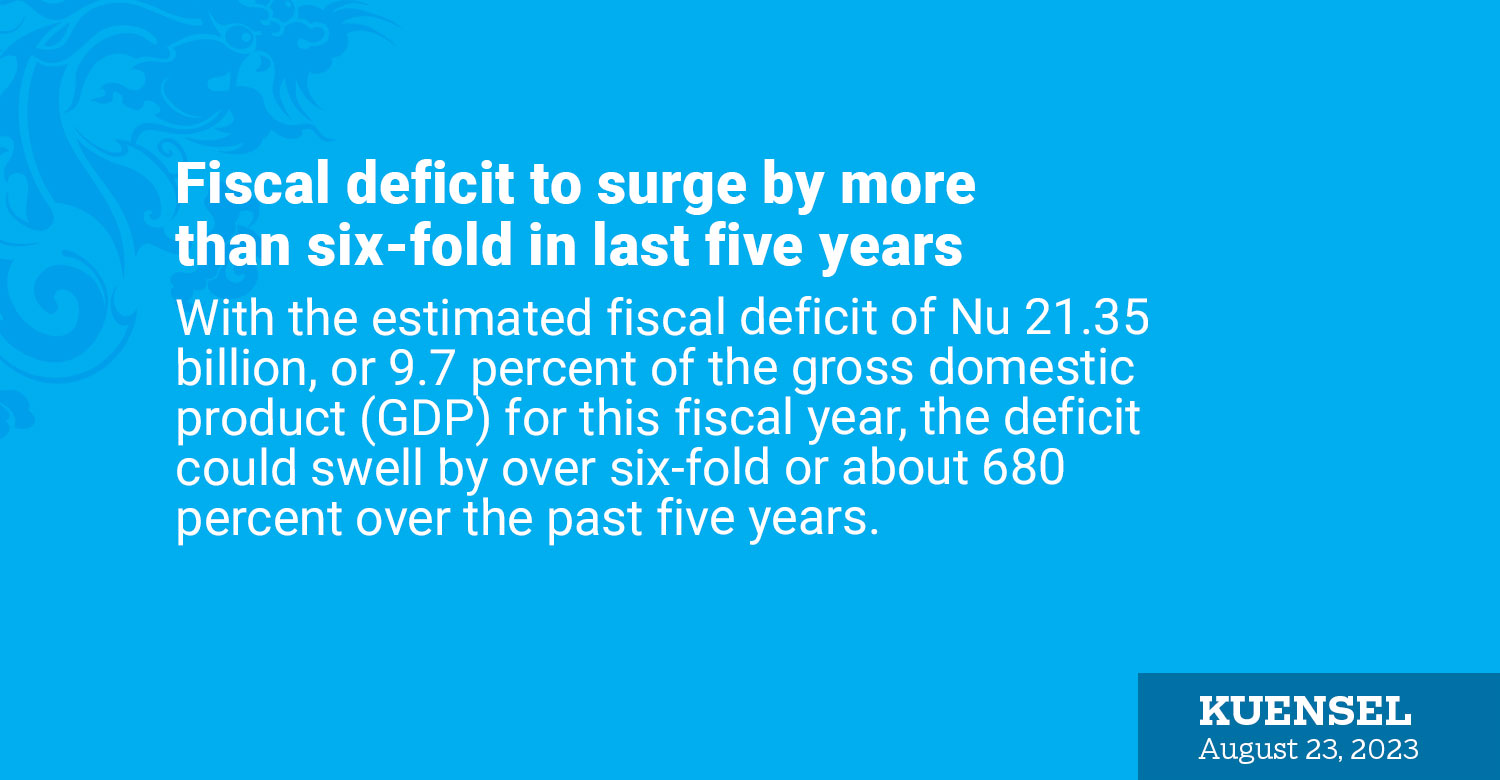…aims to contain at Nu 1.44 billion or 0.6 percent of GDP in next FY 2024-25
Thukten Zangpo
With the estimated fiscal deficit of Nu 21.35 billion, or 9.7 percent of the gross domestic product (GDP) for this fiscal year, the deficit could swell by over six-fold or about 680 percent over the past five years.
Five years ago, in the 2018-2019 fiscal year, the fiscal deficit was Nu 2.74 billion or 1.5 percent of GDP. Growing fiscal deficit over the years has been concerning for the country.
However, continuing the path of fiscal consolidation, the government intends to contain the fiscal deficit below 0.6 percent of GDP or Nu 1.44 billion in 2024-25 fiscal year.
Fiscal deficit refers to the amount by which a government spending exceeds its revenue in a specific fiscal year, resulting in increased borrowing and accumulation of the country’s debt.
When a government spends more than it generates through sources like taxes and other revenue options, it incurs fiscal deficit. This deficit is financed by concessional external and domestic borrowings.
The rise in fiscal deficit has been partly because of the impact of Covid-19 and decreased domestic revenue. However, the fiscal deficit saw an increase despite the government’s rationalisation measures and budget cuts for agencies.
Looking at the past fiscal deficit figures, the soaring deficit was observed from fiscal year 2021-22—an increase to Nu 11.14 billion from Nu 3.39 billion in 2019-20 fiscal year.
According to the finance ministry’s budget report, the government implemented an economic contingency plan with creation of new spending and allocation of higher capital budget to offset the GDP loss because of Covid-19.
Earlier, Finance Minister Namgay Tshering said that the government apportioned more capital expenditures to pump the economy as expansionary fiscal policy to boost consumption and bring the economy on track in the last two fiscal years—2020-21 and 2021-22. The country’s GDP contracted to -10.08 percent during the pandemic in 2020.
Higher government spending, by keeping the public investment high, has the potential to push up overall demand in the economy. About 38 percent of the government spending contributes to GDP.
The ministry also reported that the frontloading of grants and acceleration of 12th Plan in early fiscal years has increased the fiscal deficit.
With an increased capital expenditure by 55 percent, the total expenditure for the 2021-22 fiscal year saw an increase to Nu 77.79 billion from Nu 71.1 billion in 2020-21
The current 2023-24 fiscal year marks the end of 12th Plan, and it was designed to promote economic recovery. It is critical to ensure a sustainable fiscal stance. The budget report 2023-24 stated prudent spending in key sectors and expenditure rationalisation aligning with reform initiatives are important.
The fiscal year has a total budget at Nu 74.86 billion with a resource estimate of Nu 53.51 billion, creating a fiscal deficit of Nu 21.35 billion. Domestic revenue comprises 86.4 percent and 13.6 percent from the grants of the total resource estimate.
According to the finance ministry, despite the fiscal deficit being estimated at Nu 21.35 billion, the gross financing need is Nu 32 billion.
To meet the gross financing need, the government used Nu 4.1 billion from principal recoveries, source Nu 8.35 billion from external concessional windows, and remaining Nu 19.55 billion from domestic markets (issuance of T-bills and bonds).
However, increase in borrowings also concerns the country’s burgeoning public debt. The government had projected a public debt at 134.9 percent of GDP and external debt at 115.4 percent of GDP in fiscal year 2023-24.
In the next five years of the ambitious 13th Plan, the government targets the fiscal deficit to contain within 5 percent of GDP to avoid macro imbalances.


